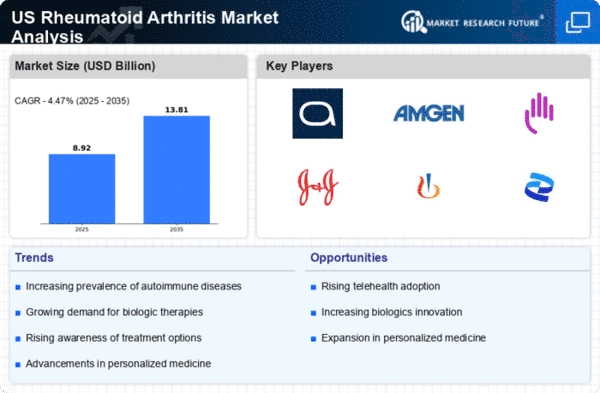Increasing Healthcare Expenditure
The rising healthcare expenditure in the US is a significant driver for the rheumatoid arthritis market. As healthcare costs continue to escalate, there is a growing emphasis on the management of chronic diseases, including rheumatoid arthritis. According to the Centers for Medicare & Medicaid Services (CMS), national health spending is projected to grow at an average rate of 5.4% annually, reaching approximately $6 trillion by 2027. This increase in spending is likely to enhance access to advanced treatment options and improve patient outcomes. Furthermore, the allocation of funds towards arthritis research and treatment programs may lead to the development of more effective therapies, thereby stimulating growth in the rheumatoid arthritis market. The focus on value-based care is also expected to drive investments in innovative solutions that address the needs of patients.
Advancements in Research and Development
Ongoing advancements in research and development are significantly influencing the rheumatoid arthritis market. Pharmaceutical companies are increasingly investing in the discovery of novel therapies, including small molecules and biologics, to address unmet medical needs. The US market has seen a surge in clinical trials aimed at evaluating the efficacy of new treatment modalities, which may lead to the introduction of innovative drugs. For instance, the National Institutes of Health (NIH) has reported a substantial increase in funding for arthritis research, which is likely to enhance the understanding of disease mechanisms and treatment options. This focus on R&D not only fosters innovation but also encourages collaboration between academia and industry, potentially leading to breakthroughs that could reshape the rheumatoid arthritis market.
Rising Prevalence of Rheumatoid Arthritis
The increasing prevalence of rheumatoid arthritis in the US is a primary driver for the rheumatoid arthritis market. Recent estimates indicate that approximately 1.3 million individuals in the US are affected by this chronic autoimmune condition. This growing patient population necessitates a corresponding rise in treatment options and healthcare services, thereby expanding the market. The aging population, coupled with lifestyle factors such as obesity and sedentary behavior, contributes to this upward trend. As more individuals seek medical attention for their symptoms, healthcare providers are likely to invest in innovative therapies and management strategies, further propelling the rheumatoid arthritis market. The demand for effective treatments is expected to increase, leading to a more competitive landscape among pharmaceutical companies aiming to capture market share.
Growing Awareness and Education Initiatives
The rise in awareness and education initiatives surrounding rheumatoid arthritis is a crucial driver for the market. Various organizations and healthcare providers are actively promoting knowledge about the disease, its symptoms, and the importance of early diagnosis. This heightened awareness is likely to lead to increased patient engagement and a greater willingness to seek treatment. According to recent surveys, approximately 60% of individuals with rheumatoid arthritis report that they were unaware of their condition until it became severe. As educational campaigns continue to expand, more patients may be diagnosed earlier, resulting in a higher demand for therapeutic interventions. Consequently, this trend is expected to positively impact the rheumatoid arthritis market by increasing the number of patients seeking effective management options.
Regulatory Support for Innovative Therapies
Regulatory support for innovative therapies is playing a pivotal role in shaping the rheumatoid arthritis market. The US Food and Drug Administration (FDA) has implemented various initiatives to expedite the approval process for new treatments, particularly those that demonstrate significant clinical benefits. This regulatory environment encourages pharmaceutical companies to invest in the development of novel therapies, including biologics and biosimilars. The introduction of the 21st Century Cures Act has further streamlined the pathway for innovative treatments, potentially leading to a more diverse range of options for patients. As a result, the rheumatoid arthritis market is likely to experience accelerated growth, driven by the availability of new and effective therapies that meet the needs of patients and healthcare providers.
















